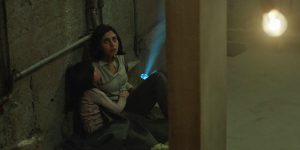
It is the 80s in Tehran, post-revolution and knee deep in the Iraq-Iran war. Husbands and fathers are being drafted, leaving behind their wives and daughters. They are not safe at home, as missiles are being dropped left and right. It is horror in the truest sense of the word; a lingering fear of the unknown. For Shideh (Narges Rashidi) and her daughter, Dorsa (Avin Manshadi), the war only scratches the surface.
The war acts as a backdrop to the real horror: a Djinn curse. Dorsa has heard stories from a neighboring child (a mute, of course, to add to the suspense) of the Djinn, how they travel in the wind and possess those caught in their crosshairs. She believes the footsteps and shadows she sees it night are of a Djinn drifting by, her mother convinced it’s nightmares caused by the war. As the supposed hauntings begin to escalate, Shideh begins to question the myth.

I mention the war acting as a backdrop because that’s all it unfortunately amounts to in the end. Babak Anvari introduces it as a transition to the Djinn and nothing more. It’s presented at first as a startling endeavor, the missiles dropping at random shocking the characters and audience. There’s a good sense of foreboding dread early on as one anticipates the next strike. As the Djinn is slowly implemented, it feels as if the two are going to mesh well. The Djinn seemingly represent the demons of war, feasting on the helpless. Just as the film is picking up steam, it sputters out.
The film is now a cookie cutter ghost story, with the Djinn acting as a lame poltergeist. It steals Dorsa’s dolls, destroys Shideh’s workout tapes, bangs on the walls, peers in through the window, and causes multiple hallucinations. Anvari relies too heavily on cheap jump scares to startle the audience, sinking the tension he was attempting to foster. Gone is the foreboding dread caused by the war, replaced now by the expectancy of boo moments.

The dread is to be replaced by the strained relationship of Shideh and Dorsa, but it’s too undercooked to fully develop. Their emotional turmoil is reminiscent of that of the mother and child in “The Babadook,” straight down to the belief of a fantastical creature driving both mad. That film succeeded by having the child’s mental anguish teeter on dementia, driving the mother and the audience insane. When the titular beast was revealed to be real, it encapsulated the terror. The horror wasn’t in the reality of the beast, but in its ability to manifest itself into society secretively, bringing forth doubt and skepticism in its victims. Thanks to this, the victim lost their sense of reality and was driven mad. For anyone that has dealt with manic depression and anxiety, they know there’s nothing scarier than frightened of one’s own thoughts.
Such is not the case in “Under the Shadow.” It relies too heavily on parlor tricks and plays its hand too often. There’s never any doubt the validity of the Djinn, nor any suspense from its presence. Its presence doesn’t complement the war, just riding on its coattails. The social commentary on politics holding down the underprivileged, mainly women, is made futile. It only plays into the second half as a device for the government to turn away Shideh when she needs them most. Her disallowance to return to medical school also falls victim to this, only existing for a meretricious scene where she attempts to save a dying man after a bomb dropping.

“Under the Shadow” starts off strongly and shows promise throughout that it’s such a shame to watch it peter out! The tension and drama in the first half doesn’t transfer to the second. The strain between Shideh & Dorsa comes across more as mild perturbation. The daughter’s possible possession adds only familiarity to the equation. Some chilling imagery and creative camerawork, such as slightly shifted angles to denote distortion, only spice up the proceedings faintly. Had the horrors of war manifested themselves more heavily, then the film may have succeeded. Alas, the mechanical ghost story drags it down as opposed to elevating it.
P.S. The rental copy on Amazon had the subtitles out of sync. They’d appear before the dialogue and actions, sometimes three lines deep before they were even spoken. This caused certain events, such as the banging on a door or a missile landing, to be spoiled a few seconds in advance. While this seems minor, it can go a long way in dismissing the tension as it strips the impact from the forthcoming moments. It doesn’t hurt the film all that much in the long run, but I’d be a liar to deny it played a part in my dissatisfaction.
Final Rating: C+
